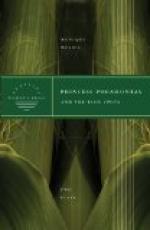The noise grew louder and more fiendish in character and the Englishman saw the corner of the mat begin to wave, to bulge as if a man were butting his head against it to raise it. Then he saw it lifted and in came a creature more hideous than Smith ever dreamed could exist. Painted all in red pocone, with breast tattooed in black, wearing no garment save a breech-clout and a gigantic headdress of feathers, shells and beads, he straightened himself to his great height. A horrible mask, distorting human lineaments, covered the face, and a medicine-bag of otter skin hung from his back and dangling from one arm as an ornament hung the dried hand of an enemy long since dead. On account of his stature and in spite of the mask, Smith recognized The Powhatan, and drew himself up proudly to meet his fate.
Behind their werowance now swarmed the other braves and chieftains, two hundred in all, and all with masks that made them as fearful, thought John Smith, as a troop of devils from hell.
To his astonishment, they did not fall upon him and in their shrieking he thought he could even distinguish the word “friend.” The Powhatan alone of them all approached him, saying:
“Have no fear, my son; we are not come to harm thee. The ceremony which thou hast heard was to call Okee to witness to the friendship we have sworn thee. Henceforth are we and thou as of one tribe. No longer art thou a prisoner but free to come and go as thy brothers here, aye, even to return to thy comrades on the island if thou so desirest. When thou hast arrived there send unto me two of those great guns that spit forth fire and death that my name may become a still greater terror to mine enemies, and send to me also a grindstone such as thou hast told me of, that my squaws may use it for crushing maize. I ask not these gifts for naught. A great chief giveth ever gifts in return. Therefore I present to thee for thine own the land called Capahosick, where thou mayst live and build thee a lodge and take a squaw to till thy fields for thee. Moreover, I, The Powhatan, I, Wahunsunakuk, will esteem thee as mine own son from this day forth.”
It was difficult for Smith during this discourse not to betray his astonishment. First came the relief at learning that he was not to be killed immediately and then the wonderful news that he was free to go to Jamestown. And if The Powhatan and his people had sworn friendship to him, would that not mean that through him the colony should be saved? He longed to know what had brought about this sudden change in his fate, but he could not ask. In as stately a manner as that of the werowance—so at variance with his appearance—and with the best words at his command, he spoke his thanks.




